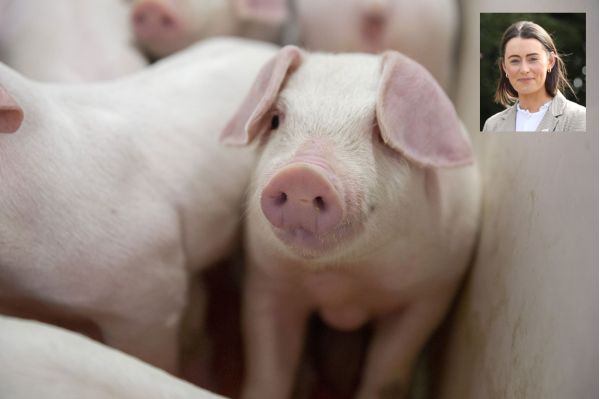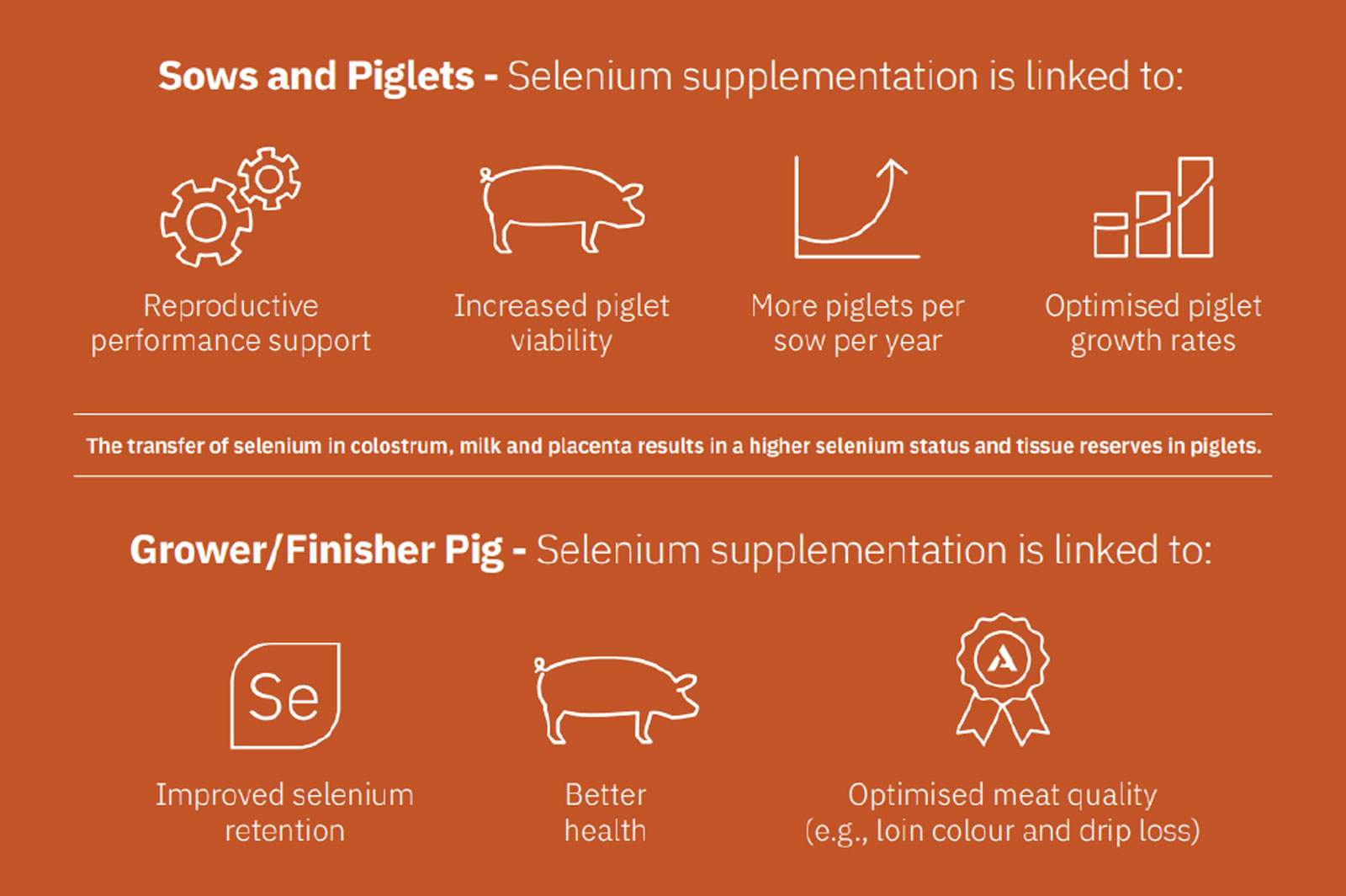Unlocking the potential of dietary selenium for optimal pig health

As an essential trace mineral, selenium is involved in a multitude of physiological processes that are critical for a pig’s wellbeing, ranging from immune functions and antioxidant defences to reproductive performance and muscle development. The form in which selenium is presented is the main determinant of its efficacy, with differences noted between the inorganic and organic forms of this trace element. In more recent years, research studying the potential benefits of organic selenium supplementation to optimise production outcomes and enhance animal welfare has gained significant interest among the feed and livestock industry. In this article, we will consider the role of selenium in pig nutrition, explore its impact on pig health and growth performance, and highlight some practical strategies for harnessing its full potential in pig diets.
What is selenium, and why is it important for pigs?
Selenium is an essential trace mineral for pigs. As a key component of selenoproteins, selenium plays a critical role in several functions, such as:
- Selenium supports immune functions by modulating inflammatory responses;
- The mitigation of oxidative stress, thanks to its powerful antioxidant properties;
- Selenium is important for reproductive health and fertility in pigs; and
- Growth and development, by contributing to several physiological processes that are essential for optimal performance.
Selenium deficiency can be a cause of concern in pig production, as inadequate selenium intake can lead to a range of health issues, including weakened immune responses, impaired growth and development, poor reproductive performance and muscular dystrophy. Additionally, selenium deficiency can exacerbate oxidative stress and inflammation, further compromising overall pig health and welfare. Pigs are particularly susceptible to selenium deficiency due to their limited ability to store selenium in the body, as well as their high metabolic demands for this essential trace mineral.
Since having an adequate intake of selenium through the diet is so important, it is essential to implement proactive measures that will help prevent deficiency and ensure that the pig’s selenium requirements are met, helping producers achieve optimal production efficiency and profitability while also providing consumers with a nutritious source of protein.
Are all selenium sources the same?
No, not all sources of dietary selenium for pigs are the same. The source in which dietary selenium is provided drives its bioavailability and effectiveness, so it’s important to select the optimal dietary selenium source to foster the best performance from pigs. Inorganic selenium has long served as the traditional form of selenium supplementation in pig feed, predominantly in the form of sodium selenite. More recently, however, the feed and livestock industry has begun re-examining the use of sodium selenite due to increasing concerns over its negative interactions with other minerals in the diet, poor bioavailability and overall safety issues.
Organic selenium, on the other hand, has been found to be a more effective source of the trace element, thanks to its higher bioavailability and retention in bodily tissues compared to inorganic selenium. These outcomes can primarily be attributed to the fact that organic selenium sources, such as selenium-enriched yeast, are absorbed and utilised more efficiently by the pig’s body. In fact, peer-reviewed research clearly demonstrates that dietary intervention with organic selenium results in an increased number of live young per animal, as well as the stimulation of immune function, overall improvements in animal health and an enhanced shelf life for meat, milk and eggs. As these benefits illustrate, supplementation with an effective organic selenium source has the ability to not only improve pig health but also to enhance overall performance and, in doing so, increase profitability at the farm level.

Figure 1. Benefits of dietary selenium supplementation in sows, piglets and grower/finisher pigs.
Conclusion
The utilisation of dietary selenium holds immense promise for unlocking optimal health and performance in pigs. As an essential trace mineral, selenium plays a pivotal role in numerous physiological processes that are critical for pig well-being, including immune function, antioxidant defences, reproductive performance and muscle development. By ensuring adequate selenium intake through the diet, pig producers can support the overall health and productivity of their herds.
Among the various selenium sources available, both inorganic and organic, Sel-Plex provides selenium in a form that is highly bioavailable and readily utilised by pigs, leading to improved selenium retention in the tissue, enhanced antioxidant activity and strengthened immune function. Moreover, Sel-Plex has been extensively researched and validated for its positive effects on growth performance and reproductive efficiency in pigs, making it a trusted and effective solution for pig producers. As the pig industry continues to evolve, harnessing the power of organic selenium sources in pig diets represents a proactive approach to optimising nutrition, promoting animal welfare and ensuring sustainable production practices.
Selenium supplementation
Organic selenium supplementation is now widely recognised as a key element for improving pig nutrition, health and wellbeing. Sel-Plex, from Alltech, is an organic selenium yeast derived from a proprietary strain of Saccharomyces cerevisiae yeast that has been enriched with selenium through a natural fermentation process. Unlike synthetic forms of selenium, such as sodium selenite or sodium selenate, Sel-Plex provides selenium in an organic form that is more bioavailable and readily absorbed by pigs. Backed by more than 30 years of research and having featured in over 300 peer-reviewed performance studies to date, Sel-Plex is the most studied and proven form of organic selenium available on the market today. Our research trials have highlighted multiple key benefits of supplementation with organic selenium in the form of Sel-Plex, including:
- Increased bioavailability: The organic selenium in Sel-Plex is better absorbed, stored and utilized by the pig compared to inorganic selenium, helping boost the pig’s defence system;
- Lower toxicity: Sel-Plex poses relatively few, if any, toxicity concerns for humans or livestock;
- Complete supplementation: Sel-Plex is designed to completely replace all supplementary organic and inorganic selenium sources in the diet; and
- Elevated pig performance: Research and commercial trials have shown that Sel-Plex supplementation results in increased sow reproductive performance, higher selenium concentrations in weaned piglets and more optimal meat quality.
With its superior bioavailability, safety and performance benefits, Alltech’s Sel-Plex stands as a trusted and effective selenium source, helping promote overall health, welfare and productivity in pigs.





